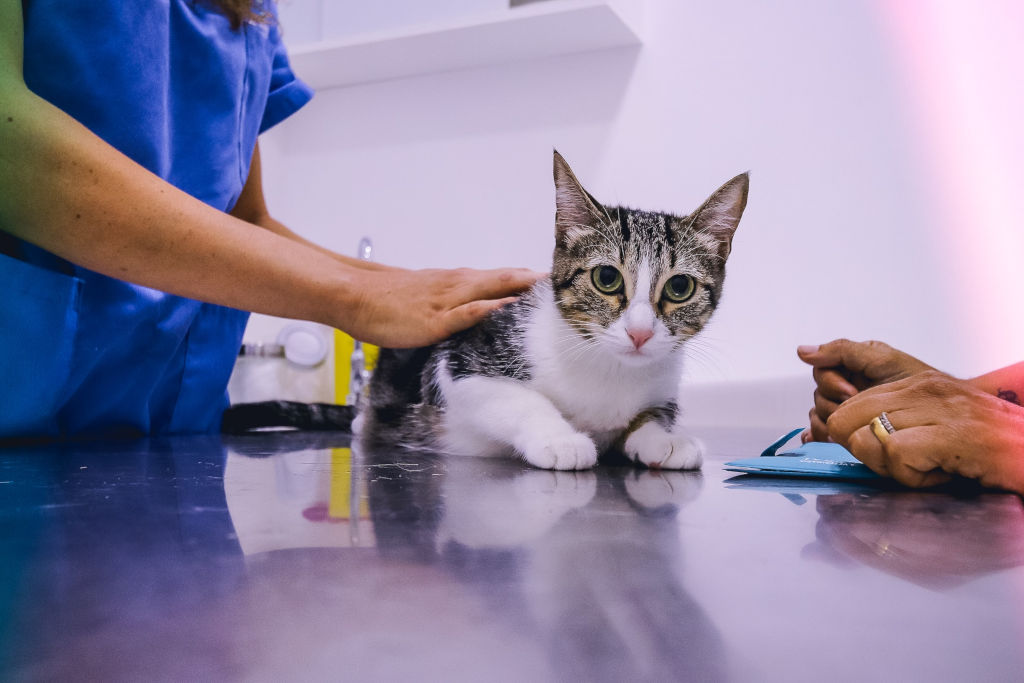Welcome to our comprehensive guide on cat titer testing—a crucial step towards safer vaccinations for your feline friend!
Uncover the hidden secrets of this underutilized method that can help you protect your cat’s health in the best possible way.
Read on to discover the why, when, and how of titer testing, and how it can revolutionize your cat’s healthcare experience.

What Is a Titer Test?
A titer test, in simple terms, is a blood test that measures the level of antibodies your cat has against certain diseases.
These antibodies are proteins produced by the immune system in response to an infection or vaccination, and they help protect your cat from future encounters with the same disease.
By assessing the concentration of specific antibodies in your cat’s bloodstream, a titer test can help you and your veterinarian determine if your cat has adequate immunity to a particular illness. This valuable information can guide decisions about whether additional vaccinations are needed or if your feline friend is already well-protected.
Not only does a titer test provide insight into your cat’s immune status, but it also promotes a more personalized approach to their healthcare, ensuring they receive the right vaccinations at the right time.
Why Titer Testing Is Important for Your Cat
Titer testing can be a game-changer for your cat’s health by preventing over-vaccination, ensuring immunity, and minimizing potential side effects. Let’s take a closer look at each of these benefits.
1. Avoiding over-vaccination
One of the key benefits of titer testing is that it helps prevent over-vaccination. By assessing your cat’s immune status, titer tests can reveal whether your feline friend already has sufficient immunity against certain diseases.
This information allows your veterinarian to make more informed decisions regarding vaccination, ensuring your cat receives only the necessary shots, reducing the risk of administering excessive vaccines. A lot of other cat health issues can be prevented by being aware.
Note:
2. Ensuring immunity
Titer testing plays a crucial role in confirming your cat’s immunity to specific diseases. It’s essential to know that your cat is adequately protected, especially if they spend time outdoors or encounter other animals.
Regular titer testing can help you and your veterinarian ensure that your cat remains safe from various illnesses over time, allowing you to have peace of mind about their well-being.
3. Reducing potential side effects
While vaccinations are generally safe, they can sometimes cause side effects in cats, ranging from mild reactions like soreness or mild fever to more severe complications.
By using titer tests to tailor your cat’s vaccination plan, you can minimize the risk of potential side effects. This personalized approach to vaccination helps create a safer and more comfortable experience for your feline companion, contributing to their overall health and happiness.
When Should You Consider Titer Testing for Your Cat?
Understanding when to perform titer testing for your cat is crucial. Factors such as age, vaccination history, and health conditions play a role in this decision. Here’s an overview of these factors, followed by recommendations on what to do.
Age of the cat
As cats grow older, their immunity can change. Titer testing helps monitor their protection against diseases, regardless of whether they are kittens or adult cats with unknown vaccination histories.
- Kittens: After completing their initial vaccination series (usually around 16 weeks of age), it is recommended to perform titer testing 2-4 weeks later to ensure they have developed adequate immunity.
- Adult cats: Experts suggest performing titer testing every 1-3 years to monitor their immunity, depending on their lifestyle and risk factors. Indoor cats may require less frequent testing compared to those who spend time outdoors or encounter other animals regularly.
Vaccination history
Titer testing provides valuable information about your cat’s current immunity, helping you and your veterinarian create a tailored vaccination plan based on their actual needs.
- Incomplete or unknown vaccination history: Titer testing can be especially helpful in determining the immune status of recently adopted cats with incomplete or unknown vaccination records. The test results can guide your veterinarian in developing a personalized vaccination plan.
- Booster shots: Instead of administering routine booster shots, titer testing can be used to assess whether your cat still has adequate immunity, thus reducing the number of unnecessary vaccinations.
Health conditions
Cats with health conditions may require special considerations for vaccinations. Titer testing helps make more informed decisions about their vaccination needs without compromising their health.
- Pregnant or nursing cats: Titer testing can help assess the immunity of pregnant or nursing cats, ensuring they pass on the necessary antibodies to their kittens. Perform titer testing before pregnancy or during the early stages to ensure adequate immunity and protect both the mother and her kittens.
- Senior cats or cats with chronic illnesses: These cats may have a weakened immune system, making titer testing crucial for determining their immunity and minimizing the risk of adverse reactions from vaccinations. Schedule titer testing at least annually or as recommended by your veterinarian to keep track of their immunity and adjust vaccination plans accordingly.
By considering these specific situations, you can make a more informed decision about when to perform titer testing for your cat, ensuring optimal protection and overall well-being.
How to Perform a Titer Test
Performing a titer test for your cat is a straightforward process that can be completed by your veterinarian. Let’s go through the steps involved, along with some recommendations:
- Schedule an appointment. Contact your veterinarian to arrange an appointment for titer testing. It’s essential to discuss your cat’s age, vaccination history, and health conditions with the vet to ensure the test is appropriate and necessary.
- Blood sample collection. During the appointment, your veterinarian will draw a small blood sample from your cat. This process is typically quick and causes minimal discomfort for your feline friend.
- Laboratory analysis. The blood sample will be sent to a specialized laboratory for analysis. The lab will measure the levels of antibodies present in your cat’s blood against specific diseases, such as feline panleukopenia, feline herpesvirus, and feline calicivirus.
- Interpretation of results. Once the lab results are available (usually within a few days to a week), your veterinarian will interpret the findings. They will determine whether your cat has adequate immunity against the tested diseases, based on the antibody levels in the blood.
- Recommendations. Based on the titer test results, your veterinarian will provide specific recommendations for your cat’s vaccination plan. This may include administering booster shots, delaying certain vaccinations, or maintaining the current schedule if the test indicates sufficient immunity.
For tips on how to reduce stress for your cat before a vet appointment, check out our article on managing stress before the vet visit. Remember to consult your veterinarian about the frequency of titer testing for your cat, as it can vary depending on factors like age, health, and lifestyle.
By following these steps and working closely with your vet, you can ensure that your cat receives the appropriate vaccinations for optimal health and well-being.

Understanding Titer Test Results
Titer test results indicate the concentration of specific antibodies in your cat’s bloodstream. Higher levels generally suggest better immunity against a particular disease, while lower levels may indicate reduced protection.
Remember that the exact threshold for adequate protection can vary between cats, as individual immune responses may differ.
Your veterinarian will compare these levels to established protective thresholds to determine if your cat has adequate immunity against tested diseases. Adequate immunity may mean no additional vaccinations are needed, while low levels may warrant booster shots.
Keep in mind that interpreting titer test results should always be done in consultation with a veterinarian, as they have the expertise to evaluate the results and consider any relevant factors specific to your cat.
Incorporating Titer Tests in Vaccination Plans
Incorporating titer tests into your cat’s vaccination plan can be a great way to ensure they receive the necessary protection without over-vaccination.
To do this effectively, have an open conversation with your vet about the benefits of titer testing and how it can be used to tailor your cat’s vaccination plan. Your vet will consider factors such as age, lifestyle, and health conditions when making recommendations.
Schedule titer tests at appropriate intervals, as suggested by your veterinarian. This might be annually for senior cats or cats with chronic illnesses, or every 1-3 years for adult cats, depending on their risk factors.
Use the titer test results to make informed decisions about your cat’s vaccinations. If the test shows adequate immunity, you can skip or delay certain booster shots. If immunity is low, administer the necessary vaccinations to ensure proper protection.
Recognizing the Limitations of Titer Testing
While titer testing is a valuable tool in managing your cat’s vaccinations, it’s essential to be aware of its limitations:
- Not all diseases. Titer tests only measure immunity for specific diseases. Some vaccinations, like those for feline leukemia or rabies, may not have a reliable titer test available. In such cases, vaccination decisions will be based on your cat’s risk factors and local regulations.
- Immunity threshold. The exact level of antibodies needed for complete protection can vary between cats. A test result indicating low immunity may not necessarily mean your cat is entirely susceptible to a disease.
- Cost. Titer testing can be more expensive than vaccinations, which may be a concern for some pet owners. Discuss the cost-benefit analysis with your veterinarian to determine if titer testing is the right choice for your cat’s specific situation.
By understanding the role and limitations of titer testing, you can make well-informed decisions about your cat’s vaccination plans, ensuring their protection and overall health.
Conclusion: Towards Safer Vaccinations
Titer testing is a powerful tool that can help you and your veterinarian create a safer, more personalized vaccination plan for your cat. By regularly monitoring your cat’s immunity levels and making informed decisions about vaccinations, you can protect their health while minimizing potential side effects and over-vaccination.
Embracing titer tests as part of your cat’s healthcare routine is a significant step towards ensuring their well-being and happiness. To learn more about your feline friend’s health and how to keep them in tip-top shape, don’t miss our other informative guides for cat owners.
Armed with this knowledge, you can confidently navigate the world of cat care and ensure your beloved feline companion stays healthy and happy for years to come.
Frequently Asked Questions (FAQs)
How often should titer tests be performed?
Titer tests should be performed every 1-3 years for adult cats, depending on their lifestyle and risk factors, while kittens should have a titer test 2-4 weeks after completing their initial vaccination series.
What do different titer levels mean?
Different titer levels indicate the concentration of antibodies in your cat’s blood against specific diseases, with higher levels typically meaning better immunity.
Can titer testing replace vaccination entirely?
No, titer testing only measures existing immunity. Vaccinations are needed to build initial immunity, while titer tests guide decisions on additional vaccinations or booster shots.
Alex, a passionate animal lover, has experience in training and understanding animal behavior. As a proud pet parent to two dogs and three cats, he founded AnimalReport.net to share insights from animal experts and expand his knowledge of the animal kingdom.




